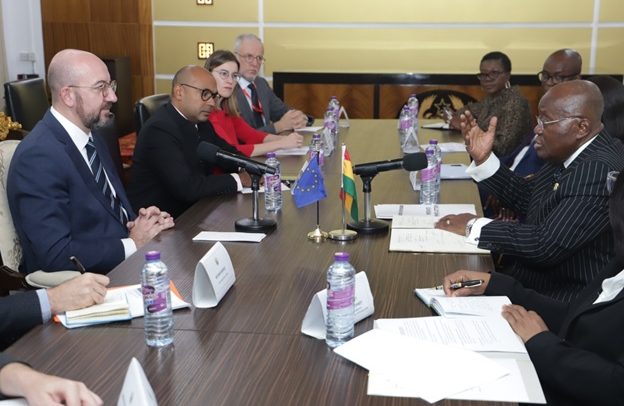President Akufo-Addo has declared his government’s intention to cooperate with the European Union (EU) to clamp down on terrorism and its related incidence on the continent of Africa.
This was when he held bilateral talks with the President of the European Council, Charles Michel at the Jubilee House Monday evening.
“Today, the epicentre of terrorists’ activities is Burkina Faso, who is our northern neighbour, even [Ivory Coast] who is our western neighbour has also been a subject of these terrorists’ attacks.
So far, touchwood, Ghana has escaped but for how long can Ghana escape”, he noted with deep-seated concern, saying “I don’t think it can be very long.”
To that end, he indicated “we have therefore to make the adequate preparation to see to what extent we can forestall it and ultimately, the most important, to find a way to actually bring an end to the terrorists’ menace in West Africa.”
Whilst he admitted that “it is not going to be easy”, the President said “that has to be our goal” and that “just as they (terrorists) were defeated in the Middle East, we have to do the same here in Ghana.”
On his part, President of the European Council Charles Michel said the Council is committed to supporting all the efforts of West African leaders aimed at eliminating terrorism and its related activities from the region.
He therefore noted that the European Council and for that matter the European Union looks forward to strengthening economic ties with Ghana and the rest of West Africa amidst the current global economic downturn.
The European Council is the EU institution that defines the general political direction and priorities of the European Union.
The members of the European Council are the heads of state or government of the 27 EU member states, the European Council President and the President of the European Commission.
The European Council defines the EU’s overall political direction and priorities, traditionally by adopting conclusions. It does not negotiate or adopt EU laws.
Established as an informal summit in 1975, the European Council was formalized as an institution in 2009 upon the commencement of the Treaty of Lisbon. Its current president is Charles Michel, former Prime Minister of Belgium.
While the European Council has no legislative power, it is a strategic (and crisis-solving) body that provides the union with general political directions and priorities, and acts as a collective presidency.
The European Commission remains the sole initiator of legislation, but the European Council is able to provide an impetus to guide legislative policy.
The meetings of the European Council, still commonly referred to as EU summits, are chaired by its president and take place at least twice every six months; usually in the Europa building in Brussels.
Decisions of the European Council are taken by consensus, except where the Treaties provide otherwise.
By Charles Takyi-Boadu, Presidential Correspondent

